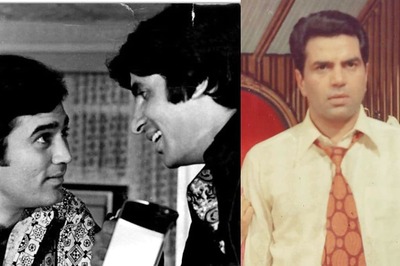
views
"I always like walking in the rain, so no one can see me crying." – thus spoke Charles Spencer Chaplin, the greatest entertainer of all times. He later added, "Humour is a gentle and benevolent custodian of mind which prevents us from being overwhelmed by the apparent seriousness of life." This is the single-most important reason why the films of Charlie Chaplin have been endearing to people – differed by gender, caste, colour, nationality, religion, age and what not.
Charlie Chaplin is that ray of hope to the struggling individual, that rainbow he can look up to forget his drudgeries. Chaplin – his image of the tramp is an icon, a harbinger of hope and wish-fulfillment in this apparently chaotic existence. There have been a few films made on him or characters shadowing on him. A relatively young phenomenon is to use Charlie impersonators for comic relief in parties and functions. So now, you go to a birthday bash, and no wonder you will be greeted at the gate by none other than Charlie. Just almost! In Kolkata atleast, it has become a profession of making up like Charlie and then engaging kids (and adults also at times) with the same gag-antics that you can expect. Like always, they all are Charlie Chaplin to us – we never care to dig behind and find who are they – the actors who make Chaplin so gleefully immortal in this part of the globe as well!
Anindya Bandyopadhyay's Bengali film Chaplin is based on the life of one such impersonator – Banshi Das. Banshi calls himself 'artist', lives in obvious dilapidated conditions with his seven year old son but with loads of fun and frolic. Banshi works in a group where there are musicians who are booked for packaged entertainment in parties. Banshi adds colour – he does a Charlie! The film tries to depict a colony life with some care which is bustling with activities. There are these easily identifiable 'bad men' who are by default affluent and prosperous. Then there is this angelic Rina didi who drives a Honda, teaches in the colony school and makes sure Banshi makes it to the audition. All these wrapped in melodrama and sentimental overtures. Almost always there is this sad, melancholy tune as background soundscape – what it actually does is, mutes few of the relevant teary sequences due to overuse and also renders the few songs in the film absolutely unnoticed.
Till the intermission, the film sets up the score with fond exchanges between the father and the son. It seems too hackneyed at times though, and with repetitions the cause isn't helped either. There are so many epic films on this special relationship so it's important that you know what exactly your scope is. The director unfortunately isn't sure of it ever. Thus came the climax after the intermission where we come to know that the son has brain tumour and he will die shortly. However, since Banshi got through to the finals of a reality show, the show must go on. This again rots from being predictable. The tragedy of Nimua, Banshi's son somehow rips the film of its sensitive possibilities. Instead, it becomes the normal Bengali tear-jerker. Or probably, marginally better.
It's marginally better because of Rudranil Ghosh who gives in a performance of a lifetime. His flights from pensive ruminations to joyous masking are a treat to watch. He and his gags at times look tired and out-of-ideas – not because he as an actor is such, more because his director fails him. In the final audition sequence as well as in the last performance in the abandoned cinema hall on Nimua's birthday, Rudranil as Charlie (and not Banshi) lighted the hearts of the audience. He seldom gets character roles to tap his latent talent which is a misfortune for the industry. Had he been born some fifty years ago, there is no doubt that he could have rubbed shoulders in the same league as the legendary Rabi Ghosh.
Charlie Chaplin's most films promote the unvanquished – the triumph of will to overturn any trouble or hardship in life. It is irony, a film made on a character who takes up Charlie to impersonate is laden with so much casual sentiments. This is such a defeating philosophy that the film is not saved. We as audience should have left for our homes celebrating the triumph of life rather than in pensive forgiving of destiny. Even if Banshi cries, Charlie never cries, he cannot cry. If the director only knew it!



















Comments
0 comment